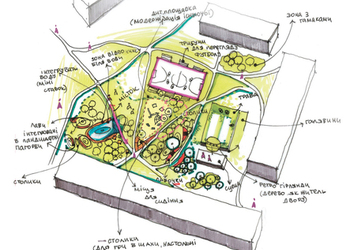This interview features Dan Nicander, the Secretary-General of the International Union of Tenants (IUT), who previously worked at the Swedish Union of Tenants for over a decade and chaired the IUT Housing Policy Working Group, and Johan Mirtorp, the Chair of the IUT Housing Policy Working Group and legal counsel with a particular responsibility for international affairs at the Swedish Union of Tenants (SUT). The conversation, conducted by Lesia Berezdetska, activist of the Tenants Union of Ukraine, took place after the Kick-off Meeting on the Rental Housing Market and Tenants' Situation in Ukraine, held in Krakow on April 25-27, 2025.
The conversation delves into the history, structure, and achievements of the IUT, as well as the Swedish Union of Tenants – highlighting tenant protections and housing policies in Sweden, where Dan and Johan have extensive experience. It also explores how Ukraine can draw lessons from their work in both organizations to strengthen its own tenant movement and housing policies.
Could you please tell me about the history of the International Union of Tenants: when and how the organization came into existence?
Dan: It was founded in Zurich, Switzerland, in 1926, which means IUT is celebrating 100 years next year. It's an independent, politically neutral, non-governmental organization. It's a membership organization for tenants’ organizations, not for individual members. And it got for the time being 77 members in 51 countries and mainly in Europe. Approximately half of the member organizations are in the EU countries.
What is the guiding idea behind IUT (the goal)?
Dan: The IUT tries to give members a voice in international contexts and influence policy. We don't just give a voice – we really try to influence policy, for example, at the EU level. That's where we focus a lot, but it could also be at the national level. If you raise, for example, a problem which is very important from an Ukrainian point of view, we could provide support from an international level but also support your case from an IUT point of view. Also, other member organizations that we inform about a certain problem you've got, can support you in your struggle in your national context.
We try to arrange or be a meeting place for tenants’ organizations around the world, both new and the established ones. So, we exchange experiences and expertise among the member organisations and we report and analyse developments. We do it in the network, arranging different ad hoc based groups. If there is a certain question on the table, then you try to put together who is interested in and who are experts in this field. And then people produce and analyse something, develop a paper or whatever.
The IUT also participates in international organizations – we represent the tenants' organizations. In that way we gain access into certain important global organizations, for example, at the Union Nation level, UN Habitat, UNECE, but also at the European level, the Council of Europe and the European Court of Human Rights, and of course, at the EU level.
Furthermore, we take part in different research networks, but also OECD, ask us of the tenants' opinions. As well as many other organisations.
We must unite to strengthen our position against landlords. Many issues persist, especially in the Global South and some Central-Eastern European countries, including yours. While contexts differ, the core problems remain: affordability and safe housing.
How is the work in the organization structured?
Dan: The IUT organises its World Conference every third year. Next year it is held in Malmö and Copenhagen – this time as a shared event. The highest decision-making body today is the Board. And the board meets at least twice a year, but normally more because of the possibility of digital meetings. Now it's 11 members in the Board. And between the board meetings, there is an Executive Committee which takes care of the decisions made at the Board. Then there are also working groups set up if necessary. And there is one that I was the chair before I became Secretary-General – the Housing Policy working group. But now Johan is the chair of the Housing Policy working group.
IUT is based in Stockholm and Brussels - there is an office in Brussels and the base in Stockholm. It's only me and the one in the Brussels office that are full time employed. And then you can realize that we cannot do all this analysing ourselves – it does different working groups.
Can you share specific achievements that illustrate IUT’s involvement in European Union commissions or politics, helping us better understand its work and impact?
Dan: The IUT actively engages with European institutions by contributing to law-making processes, offering policy recommendations, and representing tenants' perspectives. Additionally, IUT collaborates on statements like the European Affordable Housing Plan, applying its unique perspective to influence outcomes. The work of the IUT is regulated by certain fundamental documents, such as the Delft Declaration, adopted to shape housing policies ahead of critical events like European Parliament elections.
Dan: I am part of a UN working group on land management. However, we are active primarily at the EU level, even though IUT aims to engage more globally. Housing is a fundamental human right, which we might forget. But this right is recognized by many UN member countries that have signed the UN Charter, committing them to ensure safe and adequate housing for all.
I’ve read in the documents of IUT, that all over Europe tenants and home seekers are impacted by the housing crisis. One third of the European citizens, which corresponds to 150 million people, live in rental housing. According to that, could you tell what the IUT demands from the European Parliament, which are also your goals?
Johan: There are some:
- setting a 25% maximum of housing costs by 2030 (including energy and utilities);
- setting a 30% quota for social and affordable housing by 2030 by national and regional laws and regulations, direct investments, cost subsidies and substantial tax reliefs;
- respect of tenants’ rights and provide access to legal dispute resolution instances at no costs;
- ensurence the burden of renovation costs for energy efficiency by distributed equitably to counteract disparities between social groups (meaning that rent increases are at least balanced by energy savings at the same amount);
- prevention monopoly in housing market – the EU should act, and stopping the sale of the public and affordable housing stock;
- regulation short-term rentals, which threatens’ tenant rights and disrupt local communities and cetera.
Could you please briefly tell me about the history of the Swedish Tenants Union: when and how did it appear, what were the renting situation back then in Sweden and what were the needs of people?
Dan: In the 1890s, there were some early trials setting up tenants’ unions, but they failed eventually. But in 1915 was the first successful one.
Johan: We are talking about the beginning of democracy in Sweden. And, urbanization had started to a certain extent. So, people started moving into the cities, and they were living in very bad conditions and could be thrown out without notice – security of tenure was almost none. So, of course, there was a desperate need to organize and put up a unified front. And this comes roughly at the same time as the labour unions start becoming active – we often say that we belong in the greater family of labour movement and tenants’ unions.
Johan: In the 40s Sweden got the first Tenancy Act, largely initiated by the Swedish Union of Tenants. And that was extremely important for future rental legislation. And it also regulates the right of occupancy. So, this was the start of the stance against stigmatizing social housing, which was the starting point for what we call “public housing”, which is still the norm today. And that was the start of the modern housing policy.
How many members do you have now?
Johan: From a few small local unions in the early 1900s, the Swedish Tenants Union has grown to represent 585,000 households. Considering that membership covers not just the member but everyone in their household, this means roughly 1 million people are included. With Sweden’s population nearing 11 million, this represents a significant portion of its citizens.
What would be the core achievements of the Swedish tenants union in Sweden?
Johan: The main core achievement in Sweden is that we have in fact a relatively well-balanced market where there are very few losers – I know the landlords would not agree with it because they always disagree. I think that stability and predictability are the main achievements that couldn't have happened without the Swedish Union of Tenants. Landlords will get stability, but they will not get super high levels of profitability in the short term. However, over periods of several years landlords can count stable predictable yields. And, importantly, we also get stability for the tenants.
So, what are your goals now in the Swedish Union of Tenants?
Johan: Our goal is what it always was – we want decent housing for all and at a reasonable cost. That is what we do for a living, we promote decent housing. There should be a certain level of standards and you should pay in accordance with the standards and it shouldn't be outrageous. That's as simple as it is.
Dan: The Swedish Union of Tenants think it's really important to grow steadily, continue growing in order to take the important place in the political debate, and to put pressure on elected governments to support or advocate for the tenants. So, it's about 585,000 members today, but the SUT are striving for 800,000 members by 2030. That's an extremely high goal. And also to increase the number of elected people and active members – they have a role at the local, regional or national level. Then the movement can do really big things together.
You have in Sweden these “housing tribunals” – when and how did they come into existence, how do they work?
Johan: The housing tribunal, established in 1973, operates like a court with a judge, a tenant representative, and a landlord representative deciding cases based on the Tenancy Act and Rent Regulation Act. Issues like disturbances between tenants are handled here, while other civil matters go to regular courts. Appeals from the tribunal are directed to the normal appeal court. There’s no fee, and most cases are resolved in a single meeting. However, before reaching the tribunal, tenants often seek advice from the Swedish Union of Tenants, who involve lawyers to negotiate with landlords and resolve most issues without court involvement.
What do negotiations between tenants and landlords look like? Could you describe the process?
Dan: Negotiations begin with local tenants’ organizations holding annual meetings to elect negotiation delegations. Next, local housing forums are organized, open to all residents – not just union members – to gather input and provide information about the upcoming negotiations. The elected delegation then meets to formulate joint strategies before entering discussions with landlords. During negotiations, both elected representatives and union employees advocate for tenants. Once concluded, results are shared with all residents, agreements are signed, and information is distributed. This process, guided by the Tenancy Act and Rent Negotiation Act, ensures agreements benefit all residents, not just union members. Collaboration and coordination between local, regional and national levels are crucial.
Open-ended contracts – what are they and how do they work in Sweden? How did they come to be a social norm?
Johan: Open ended contracts are the presumption in Sweden. If you enter into a tenancy contract, it's normally open-ended unless you specifically specify in the contract that it is for a short period of time. This is like the foundation for tenancy protection that you could potentially live there your whole life. So, both homeowners and tenants can predict how it's going to look like year one, year two, year three and so forth. The contract is open-ended, but the rent is adjusted in accordance with the rent negotiations that take place every or every other year – meaning, landlords can't raise the rent in a completely unpredictable way, because then, of course, the rent could become so high that tenants were forced to leave, and then it wouldn't be open-ended anymore. Even if a tenant leaves, the landlord cannot dramatically increase the rent as negotiations are required.
Who can terminate the contract – tenants and landlords – and which reasons could be valid? In Sweden, can both the tenant and the landlord terminate the contract and request
Johan: The main rule is that if you enter into an open-ended contract, the tenant can always terminate the contract, three-month termination. As for the landlord, normally, there would be a specific reason applicable to terminate such a contract. This could be things like breaches of contract, disturbances, you haven't paid the rents repeatedly – these kinds of things.
Could you explain a bit about the concept of "housing tenure neutrality"?
Dan and Johan: The concept of housing tenure neutrality revolves around ensuring that owned and rented properties are treated equally by governments and authorities - because they often prioritize owned housing in policies, perpetuating a narrative that favors ownership, especially in countries, where 90-95% private ownership and only 5% rental housing. In Sweden, and globally, this neutrality is often absent, as owned housing typically benefits from favorable conditions such as tax cuts for renovations and other subsidies (for instance, in Sweden, homeowners can receive a 50% tax deduction on labor costs for renovations). However, tenants themselves have no access to such benefits, leading to a disparity in housing quality and investment incentives. Achieving tenure neutrality, that the SUT advocates, would not only improve rental housing standards but also ensure a fairer distribution of resources across all housing types, taking into account that nearly a third of Swedes live in rental housing.
How do you find new members for your union?
Johan: There are many people employed in the SUT recruiting new members – they are going out knocking at doors to the apartments – many doors every day, that's the main source of getting new members. But over the years, the organization has been very good in campaigns, including online, advertising, sometimes in the television and newspapers, etc., which also brings in new members.
What are the possibilities for regulation in the rental market in Ukraine? Could you summarize what in your opinion are the best practices in rent that every country should strive for?
Dan and Johan: Predictability and stability and transparency are really, really important. And that can be achieved by defining tenants’ rights – it involves outlining landlords’ rights, creating a balanced and transparent framework. And then gradually you can create a more equal, transparent and more balanced system that benefits all parties. For tenants it could be such as a fair rent-setting process and the sort of conditions offers the opportunity to lead predictable lives.
Ukraine has an opportunity to strengthen its administrative systems and democracy by ensuring accountability and trust in public governance. This might be a very good moment to make your tax systems efficient. Popular trust in the system creates the conditions for a system such as taxation to work efficiently and fairly. Effective reforms require not only political commitment but also the active participation of public workers at all levels, which is connected with the institutional capacities and ambitions of the country. Otherwise, there is a heightened risk for corruption. Enforcement of laws must be consistent and transparent, with visible outcomes like investments in affordable housing to build public trust - we pay taxes and therefore we get affordable housing. A certain level of regulation is very good to stabilize the market – it would be an argument for the national politicians, they need to start thinking about how from a macroeconomic perspective to shape the country.
It's extremely difficult to just say, reform it like this or reform it like that, because it has to fit into your context. It's developed step by step alongside the development of democracy and all other institutional parameters in society. You couldn't do it from one day to another because people employed by the public service systems also have to enforce the laws and they have to believe in this. Shadow systems aren't beneficial long-term, and transparency and stability are key for people to respect law and pay taxes. As your democracy develops and becomes stronger and stronger, also your administrative systems will be stronger. I think the SUT case or any European best practice can only be an inspiration.
How can you recommend structuring goals in the Tenants Union of Ukraine?
Johan: Based on the discussions held in Krakow it seems the Ukrainian system still lacks predictability and stability. Rental agreements are often informal, and even when formalized, they tend to restrict tenant rights compared to what the Civil Code guarantees.
To improve the housing system, it’s essential to first build a strong tenant movement. Start by forming small organizations, then focus on raising awareness. Once people understand their existing rights – even if limited – they can begin to enforce them. This builds trust in the system, which is crucial for pushing for better legislation and stronger protections, step by step.
What are the benefits of joining the International Union of Tenants (IUT) for the Tenants Union of Ukraine?
Dan: Joining the IUT offers access to international discussions, policy advocacy support, and the ability to give national issues international visibility. Members gain resources, tools for building associations, and event notifications, all with limited financial risk due to the availability of a free membership as an associate member. Otherwise, the ordinary membership fee is EUR 60 / year. The network fosters collaboration and provides inspiration for adapting solutions to Ukraine’s context.
Being part of this network opens doors and ensures you are not working alone. We are all united around the statement that housing is a fundamental right, and only by coming together we do become strong enough to advocate security, dignity, and equality in housing.
Main photo: Alex Skobe / Unsplash
We prepared this publication as part of the project "Laboratory of Evidence-Based Recovery and Cohesion," implemented with financial support from the Matra Program of the Kingdom of the Netherlands.





